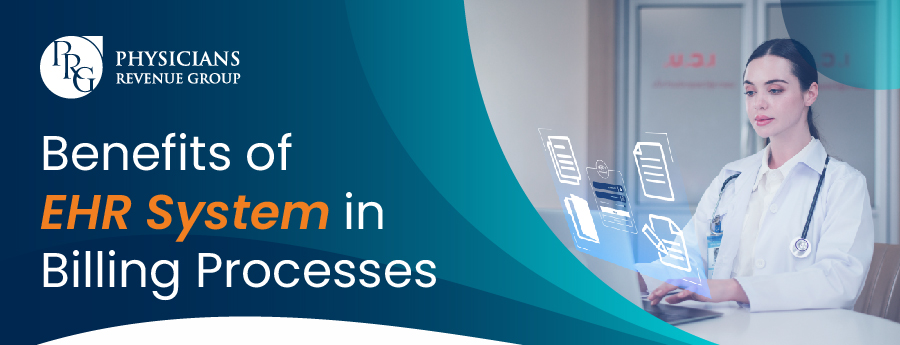
Email: info@prgmd.com | Call: +1 (630) 242-6474
Business hours: 9:00 to 5:00 | Monday to Friday
Email: info@prgmd.com | Call: +1 (630) 242-6474
Business hours: 9:00 to 5:00 | Monday to Friday

Table of Contents
ToggleIntegration of EHR systems with RCM solutions enhances claims management efficiency. In addition, it also automates the charge capture and facilitates real-time eligibility verification while optimizing the billing processes to accelerate timely reimbursements. An EHR system also lets physicians exchange information with each other remotely and in real-time, thus, ensuring every physician dealing with a patient has access to an updated, accurate, and complete patient files. The EHR medical billing system is also customizable and configurable, about the niche requirements of your practice.
Medical practices can significantly reduce their risk of falling under audits and sidestep down coding, both of which result in loss of revenue. EHR can improve revenue collection and help evade preventable costs by ensuring your clinical documentation is properly aligned.
The EHR platforms facilitate real-time documentation of patient encounters, treatments, diagnoses, and procedures. The live and current record of data ensure that the whole medical billing process remains up to date, while capturing all relevant information needed for accurate billing processes. Physicians armed with real-time documentation can access and review patient records. Thus, making it easier to justify medical necessity, comply with coding guidelines, and validate claims during audits and appeals.
Sluggish payments of outstanding bills drain a practice’s revenue flow. Further deteriorating this situation is not using an EHR billing system or software. Without an EHR system, a medical practice must compensate for administrative resources for billing delinquent and current accounts. A billing software’s advantages are illustrated through research and clear case studies, which in hindsight, offer tangible proof of their potential use and value addition. Hence, while opting for billing software, medical practices must consider their existing billing practices and whether or not the investment in billing software can add value to their operations.
A well-organized RCM process is essential for the financial success of medical practices, and an EHR system offers robust functionalities and tools for optimizing your practice’s revenue cycle management. The EHR systems can verify insurance eligibility and produce electronic claims while tracking the claims’ progress throughout the reimbursement process. EHRs offer seamless integration with the coding software to assist in accurate coding. EMRs also ensure appropriate and timely reimbursements. Streamlining the revenue cycle using EHRs can help physicians cut down on administrative costs. In addition, it can also decrease claim denials and speed up payment turnaround times.
Compliance with regulatory guidelines is an important aspect of medical billing. The EHRs support compliance by offering prompts, templates, and alerts—these guide physicians with the documentation of important information for precise coding and billing processes. An EHR system also ensures physician practices adhere to security and privacy regulations, safeguarding patient data and lowering the risks of data breaches. Through maintaining compliant and comprehensive documentation, healthcare providers can easily mitigate any financial or legal risks associated with erroneous billing practices.
EHR implementation in a medical billing process offers many advantages for healthcare practices. From amplified accuracy to enhanced RCM and compliance, EHR systems can help boost your practice revenue in many ways. Embracing EHR systems and technologies can help providers optimize their billing operations, decrease administrative burdens, and advance the financial outcomes of their practice.
EHR systems’ integration is a crucial step towards achieving a sustainable and efficient healthcare system.
An EHR system offers payment and billing tools to manage the income stream and ensure timely payments. Efficient EHRs offer automatic errors scrubbing of the claims, which otherwise may lead to claims denials or rejections.
The HER billing software streamlines billing and payment operations, all under a systemized medical billing system. The EHRs facilitate medical providers in managing patient records, submission of electronic medical bills, processing of claims, electronic health records, and for easier tracking of payments.
The EHR systems collect, maintain, and record patient data. This data can include patient demographics, diagnoses, medical history, prescriptions, allergy lists, relevant documentation, and lab results. These are important for effective patient management and treatment through multiple healthcare providers.
Share:
Categories
Recently Added

What is a TPE Audit in Healthcare

What is an ABN in medical billing?

What does a Clearinghouse do During Claims Submission?
We Would Love to Assist You!
We treat your data confidentially and don’t share any information with a third party.